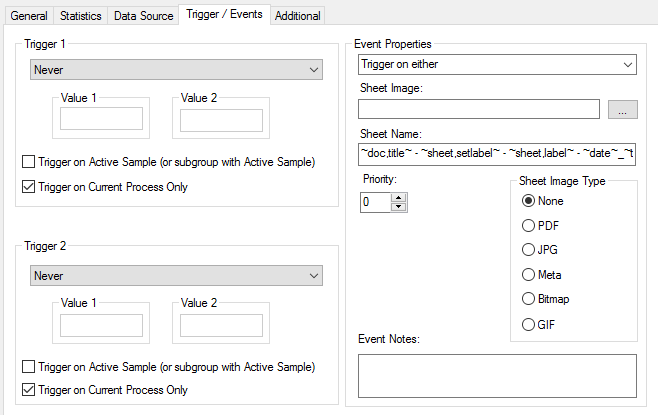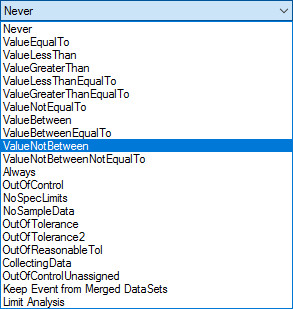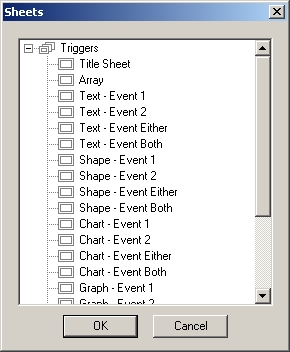The Trigger / Events tab of the DataSet Properties dialog allows you to set up internal triggers and external CM4D events. An external event notification is triggered when at least one value in the DataSet meets the criteria defined by Trigger 1 or Trigger 2.
 |
||
|
Event Properties |
The right half of the Event tab is used for triggering external events, such as sending events to EventSmith or Scheduler. The Event Properties settings are a direct correlation to what EventSmith is going to do. These options can be set up in an unmanaged document, but will only be used once the document is managed.
|
|
|
Event Notes |
Any text may be entered in the Event Notes field, including a few select CM4D variables that will resolve in the Event notification e-mail. |
|
|
Priority |
A user-defined number which can be used to alert users of a particular event priority defined by the EventSmith Administrator. This number will in no way affect how events are processed by CM4D. |
|
|
Sheet Image |
Click the browse button to open the Sheets dialog. If you select a sheet from the list, an image of the selected sheet will be included in the notification e-mail sent by EventSmith. The Array sheet may be used, although if the Array sheet is used as the Sheet Image, PDF's must be selected from the Sheet Image Type to get all of the sheets in the SheetSet.
Summary tables showing an overview of triggered cells is one example of commonly used Sheets for Sheet Image. |
|
|
Sheet Image Type |
Determines what file type will be used when sending an image of the sheet included with the e-mail notification. Only PDF's should be used when the Array Sheet is used as the Sheet Image. |
|
|
Sheet Name |
The Sheet Name section contains 5 default variables to resolve a composite name for the Sheet Image. Other CM4D Variables or user-defined character strings may be used instead.
|
|
|
Trigger 1 / Trigger 2 |
The left half of the Event tab is used to set the triggers for the data within the DataSet. These triggers are used for internal events, or events which are triggered for annotation within CM4D and CM4Di. Various annotation allow you to apply an event action, but to do this, you must have a DataSet with at least one Trigger set. If you select Draw only if Triggered as the event action for an annotation, you must set the corresponding event Trigger 1 or Trigger 2 (e.g. setting a red X to appear if the value of a sample exceeds a set amount). See the section below for descriptions of the trigger options. |
|
|
Trigger on Active Sample (or subgroup with Active Sample) |
Selecting the check box "Trigger on Active Sample (or Subgroup with Active Sample)" will cause the trigger selected from the list to be applied only on the active sample. The Trigger on Active Sample option can be used in a CM4Di template to show only the active sample. |
|
|
Trigger on Current Process Only |
When dealing with multiple processes, CM4D triggers events only on the current process by default. If you want events to trigger on all process baselines, deselect this option. |
|
|
Value 1 / Value 2 |
Fill in the Value 1 and Value 2 fields when applicable to the selected trigger type. For example, Value Not Between would require two boundary values to define the acceptable range. |
|
See the topic Triggering an Event for more information on how to setup event triggers using annotation.
Trigger Options
Selecting the type of trigger from the dropdown determines the circumstances under which a trigger will occur.
 |
Always |
Trigger is active for the DataSet regardless of the state of the contained data. This can be used for annotation or styling you always want present or to always send event notifications. |
| Collecting Data |
A process baseline is in Collecting Data mode when control limits have not yet been calculated or have been deleted for that process baseline |
|
| Keep Event from Merged DataSets |
When this trigger is used, all the Event Triggers assigned to the individual DataSets inside of a DataStack will be used to trigger events, instead of the DataStack itself. When this Event Trigger type is selected for one Trigger, the other will automatically be set to the same type. The Event Properties for the DataSets will be ignored, and the Event Properties for the DataStack will be used for generating the Event notification. If you have multiple Event Triggers that you want to monitor, but only want a single e-mail notification to be sent if any of those Events has triggered, use Keep Event from Merged DataSets. |
|
| Limit Analysis |
Not used at this time. |
|
| Never |
Trigger is inactive. |
|
| No Sample Data |
Triggers when no sample data is loaded. |
|
| No Spec Limits |
Triggers when there is no specification limit defined for a nominal value. |
|
| Out of Control |
Triggers when data fits the criteria of being out of control. |
|
| Out Of Control Unassigned |
Triggers when data fits the criteria of being out of control AND not having a Cause assigned. |
|
| Out Of Reasonable Tol |
Triggers when data fits the criteria of be out of reasonable tolerance. |
|
| Out Of Tolerance |
Triggers when data is outside of tolerance definded by Specification Limit. |
|
| Out Of Tolerance 2 |
Triggers when data is outside of tolerance defined by Specification Limit 2. |
|
| Value Between |
Triggers when data fits between the two values provided. |
|
| Value Between Equal To |
Triggers when data fits between the two values provided or is equal to either value. |
|
| Value Equal To |
Triggers when data is equal the value provided. |
|
| Value Greater Than |
Triggers when data is greater than the value provided. |
|
| Value Greater Than Equal To |
Triggers when data is greater than or equal the value provided. |
|
| Value Less Than |
Triggers when data is less than the value provided. |
|
| Value Less Than Equal To |
Triggers when data is less than or equal to the value provided. |
|
| Value Not Between |
Triggers when data does not fit between the two values provided. |
|
| Value Not Between Not Equal To |
Triggers when data does not fit between the two values provided nor is equal to either value. |
|
| Value Not Equal To |
Triggers when data does not equal the value provided. |


